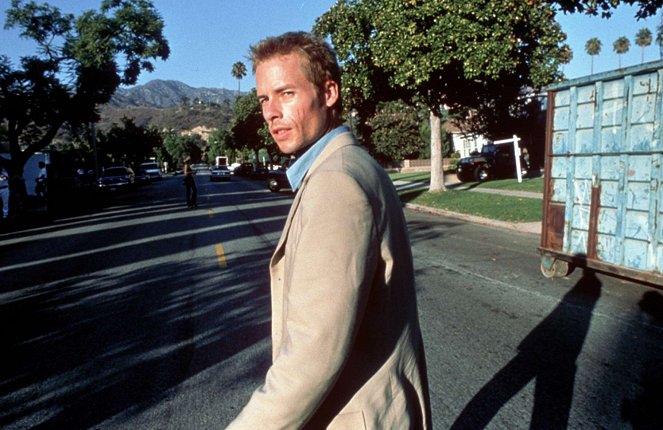Rendező:
Christopher NolanForgatókönyvíró:
Christopher NolanOperatőr:
Wally PfisterZeneszerző:
David JulyanSzereplők:
Guy Pearce, Carrie-Anne Moss, Joe Pantoliano, Mark Boone Junior, Jorja Fox, Stephen Tobolowsky, Harriet Sansom Harris, Thomas Lennon (több)Tartalmak(1)
Leonard Shelby (Guy Pearce) életét egyetlen cél vezérli: megtalálni azt, aki megölte és megerőszakolta feleségét és bosszút állni haláláért. Leonard azonban egy furcsa, gyógyíthatatlan betegségben szenved. Amnéziás és a frissen szerzett élményekre is képtelen emlékezni. Egyetlen dologban biztos csupán: bosszút akar állni. Betegsége azonban különösen megnehezíti ezt. Polaroid képekkel dokumentálja minden lépését, névjegykártyák, dokumentumok, tetoválások segítségével próbálja összerakosgatni élete és a brutális gyilkosság darabkáit. A szálak egyre bonyolódnak, mindenki gyanússá válik, talán még maga Leonard is. A nagy kérdés pedig még mindig nyitva áll: ki a gyilkos? (Kinowelt)
(több)Videók (1)
Recenziók (12)
Memento has just a few blemishes on its beauty; bland music, two logic hiccups and one or two other problems. But they are just tiny little spots and the in essence simple screenplay is genius storytelling. I wouldn’t compare it to the Czech movie Happy End; Memento doesn’t go backwards, it’s just the individual chapters that go backwards here. Nolan proved that, even with minimum resources, it’s possible to shoot a thriller of genius if you have good screenplay combined with inventive directing.
()
When your life becomes a point-and-click adventure and you find yourself again and again in unfamiliar places, where you try to figure out what to do with the aid of the objects that you have with you and around you... Leonard’s only “data repository” is his own body (not his mind), on which he has important information tattooed (an extension of his body is a Polaroid camera, which he uses to take pictures of the people entering his life and which therefore replaces his visual memory). His identity is based only on what he has written down and what can be interpreted in conflict with the original meaning, which is perhaps an even more relevant theme today, in an age when we let our lives be controlled by smartphones, than it was at the turn of the millennium. The expression of uncertainty in the relationship of the “self” to itself and to the outside world comprises only one of the levels of inspiration in Nolan’s ambitious updating of noir conventions for the (post)modern era (the formalistically unique films of European modernist cinema served him well in this regard). The director’s aim was to put us in the position of a man with no short-term memory. The narrative perspective is fixed on Leonard throughout the film. We see and hear only what he sees and hears. The protagonist does not remember what happened a few minutes ago and because of the non-chronological narrative, we don’t know either. Because we know the future, however, we can piece together the overall picture more easily than Leonard can. We gradually assign causes to the consequences of events and try to arrange events in chronological order in our minds, which is a slightly more demanding thought process requiring a different schematic than in the case of a standard narrative running from point A to point B. On the other hand, the linearity of the film (which makes Memento different from Following with its scenes in a jumbled sequence) makes our work easier. The individual scenes in the colour and black-and-white storylines build on each other. The former runs backwards and the latter forward in the standard way (and though it pretends to be a more objective record of reality, it contains flashbacks that are not entirely reliable), so that they intersect in the climax, which is strikingly reminiscent of the beginning and thus draws attention to the hopeless cyclicity of Leonard’s situation. At the same time, the two storylines are complementary in many ways and help us to understand the protagonist’s situation and his objective relatively early in the film. If Memento ran chronologically, it would lose a substantial part of its mysterious nature, unravelling the mystery would be a much smaller challenge and the themes of remembering, forgetting and the flow of time would not have been incorporated directly into the structure of the film. In other words, the complexity of the narrative is not an end in itself, but a determinative feature. 90%
()
A riveting essay for dyed-in-the-wool theorists of film narratology? Above all, a brilliant film with everything that a quality thriller must include. The performances of Guy Pearce, Carrie-Anne Moss and Joe Pantoliano are precise, lively, perfectly fitting to the characters. The main star, however, is Jonathan Nolan, who gives a lesson in both screenwriting and directing. The move to bring the viewer closer to the perspective of the main character (i.e., the perspective of quickly forgetting the past story) by telling the story from the end is excellent, but the real delicacy is its portrayal. Nolan has an incredible win here with the construction of Memento, sending small clues around the fiction world that the viewer can hardly realize in the initial disorientation, and therefore has good reason to return to the film. The ending (actually the beginning) is very confusing, but it corresponds exactly to the trick of subjective vision through the eyes of the main character. The relativity of the reminders and "truth" of the past is portrayed par excellence. But the most entertaining thing about Memento is the detective level, which the viewer has to reconstruct so laboriously that you get blisters from the turning of the narrative stream and sweat breaks out on your forehead. Memento deserves five stars for the blisters and for the sweat, and the nickname of one of the most interesting films of recent years.
()
This amazingly original thriller was a truly unique experience. I don’t remember ever exercising my brain so much. It’s one of those few films that can never put anyone to sleep, and although it made me pretty tired, I couldn’t go to sleep after it, it makes you think even after it has finished. And I can’t avoid watching it again. Magnificent.
()
Narrative excellence where the inverted form of narration is the means, not the purpose. Nolan, in his first overseas outing, gives credit to his favorite properties (the man still wears his wedding ring after losing his wife) and teases with simple and economical filmmaking, where the characters and the plot play the primary role, where watching them is a challenging sport, and where even a moment's inattention can leave you in the dark. I'm fascinated by how, despite knowing the "good" ending, Nolan puts the pieces of the puzzle together impressively, with the reverse form creating tension even more strongly than traditional chronology. Who knew that this same person would one day make the most distinctive comic book trilogy and be able to afford to make spectacular sci-fi without using green screens, but... in retrospect, it feels like a deliberate journey by a purposeful filmmaker, just like this film.
()



Hirdetés